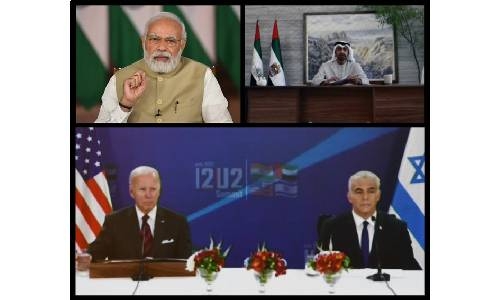UAE to invest $2 billion in India’s food parks
Agencies | Dubai
The Daily Tribune – www.newsofbahrain.com
The United Arab Emirates yesterday pledged to invest US$2 billion to develop a series of integrated food parks across India. The project announced by UAE President, Shaikh Mohamed bin Zayed Al Nahyan will incorporate state-of-the-art climate-smart technologies to reduce food waste and spoilage, conserve fresh water, and employ renewable energy sources.
India, Prime Minister Narendra Modi said, will provide appropriate land for the project and will facilitate farmers’ integration into the food parks. US President Joe Biden said the investment could “increase India’s food yields in the region three-fold in just five years” Besides, the US and Israeli private sectors will be invited to lend their expertise and offer innovative solutions that contribute to the overall sustainability of the project.
These investments are aimed at maximising crop yields and, in turn, helping tackle food insecurity in South Asia and the Middle East. The announcement came during the first virtual meeting of the "I2U2” Group in Jerusalem. The Heads of the governments of India, Israel, the United Arab Emirates (UAE), and the United States were present during the meeting which focused on the food security crisis and clean energy.
The meeting discussed joint investments and new initiatives in water, energy, transportation, space, health, and food security. The four countries would also advance renewable energy projects in India, including wind and solar energy plants, they said.
300 megawatts in Gujarat
The leaders also decided to advance a hybrid renewable energy project in India’s Gujarat State consisting of 300 megawatts (MW) of wind and solar capacity complemented by a battery energy storage system.
The US Trade and Development Agency funded a feasibility study for the USD 330 million project. UAE-based companies are exploring opportunities to serve as critical knowledge and investment partners.
Health, connectivity
The meeting further affirmed to mobilise private sector capital and expertise to modernise infrastructure, advance low carbon development pathways for industries, improve public health and access to vaccines, and advance physical connectivity between countries in the Middle East region.
Decisions were also taken to jointly create new solutions for waste treatment, explore joint financing opportunities, connect our startups to I2U2 investments, and promote the development of critical emerging and green technologies, all while ensuring near- and long-term food and energy security. The leader also reaffirmed support for the Abraham Accords and other peace and normalisation arrangements with Israel and other common areas of mutual interest.
Related Posts

